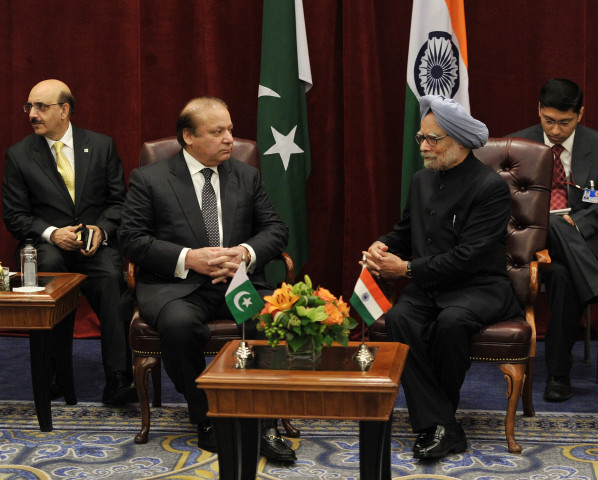Serving up peace
Both prime ministers Nawaz Sharif and Manmohan Singh have proven themselves to be men of peace.

Indian Prime Minister Manmohan Singh (R) meets with his Pakistani counterpart Muhammad Nawaz Sharif at the New York Palace Hotel on September 29, 2013. PHOTO: AFP
The fact that the first-ever face-to-face dialogue between the two leaders took place at all was a major achievement. Firing incidents at the Line of Control (LoC), dividing the two parts of Kashmir, some weeks ago, and more recent militant attacks on an army camp within Indian-held Kashmir had led to fervent cries from hawks, most notably on the Indian side of the border, to call off the meeting. The commitment shown by Prime Minister Singh in this respect is commendable, given the pressures he had been placed under. It is also a positive sign that at their New York discussions, both sides agreed to call a ceasefire on the LoC. This is a welcome development and may prevent problems such as the ones we saw recently arising again.
Of course, there are issues and some of these were brought up at the discussion. The Indian side sought swifter action against the Jamaatud Dawa, which New Delhi has consistently alleged was involved in the 2008 siege of Mumbai. The Pakistani side made an assurance that the Punjab government was handling this. Terrorism is, of course, a key concern for both nations and while ahead of the September 29 meeting, in a somewhat terse statement, the Indian prime minister had described Pakistan as an ‘epicentre’ of terrorism, it should of course be noted the problem in part stems from issues with militancy within India itself and its own policies in Kashmir. If issues between the two nations are ever to be sorted out satisfactorily, this matter will need to be addressed.
But of course, progress can only come step by step. The meeting in New York in this sense represents a huge step forward. The evidence that both leaders struck a good rapport and the expressions of goodwill we heard are good signs too. We welcome the meeting in the strongest terms and hope it will help put a stalled peace process back on the road again. This is what is required most of all for the region and for the people of both countries. It is obvious that better relations between the two nations are vital if there is to be development in these nations and an establishment of greater stability across South Asia as a whole. The issue of Afghanistan, of course, also comes up in this respect; it is another area over which New Delhi and Islamabad have had differences.
Such differences can, of course, only be resolved if the peace process continues. The indications we have had over the years that certain elements may not want this is disturbing. But right now, the main concern for the future revolves around what is to happen in India following the 2014 election. Both prime ministers Nawaz Sharif and Manmohan Singh have proven themselves to be men of peace. Both have expressed positive views on more than one occasion in favour of peace and indeed, the urgent need for it. Without this resolve, the New York meeting would not have happened. But with the possibility that a set-up less committed to good ties with Pakistan may be elected into power in India, a degree of uncertainty lies ahead. We can only hope though that the vision painted in New York will indeed be carried through and that we will continue to see efforts to unravel the issues which have held us back for so very long, damaging the welfare of both nations.
Published in The Express Tribune, October 1st, 2013.
Like Opinion & Editorial on Facebook, follow @ETOpEd on Twitter to receive all updates on all our daily pieces.














COMMENTS
Comments are moderated and generally will be posted if they are on-topic and not abusive.
For more information, please see our Comments FAQ